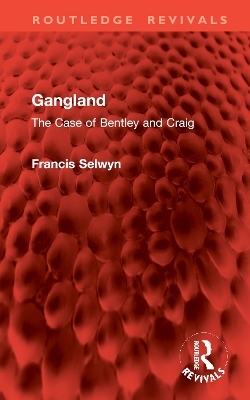
Gangland
The Case of Bentley and Craig
Seiten
2025
Routledge (Verlag)
978-1-032-96135-4 (ISBN)
Routledge (Verlag)
978-1-032-96135-4 (ISBN)
- Noch nicht erschienen (ca. März 2025)
- Versandkostenfrei
- Auch auf Rechnung
- Artikel merken
Originally published in 1988, Gangland evokes the high drama of the weeks in the autumn of 1952 when PC Sidney Miles was shot and the subsequent trial of Bentley and Craig. Now a proven miscarriage of justice this account lays out the facts of the case including the public hysteria and media frenzy at the time.
On the evening of 2nd November 1952, a shot fired from a makeshift weapon on a warehouse roof in Croydon killed PC Sidney Miles. Next morning the newspaper headlines proclaimed a Chicago gun-battle in London, gangsters machine-gunning armed police over the rooftops.
But the trial of Bentley and Craig affronted common sense and alienated a generation raised in the post-war suburbia of cinemas, coffee bars and drab streets. How could Derek Bentley, nineteen and with learning difficulties, be hanged for a murder committed a quarter of an hour after he was arrested? Lord Chief Justice Goddard and the Home Secretary, Sir David Maxwell Fyfe, found a way. The nation was split into those determined to teach young thugs a lesson and those dismayed by an act of judicial murder. The execution of Bentley, wrote Kenneth Allsop in Picture Post, caused an emotional upset in England comparable only to Dunkirk and the death of George VI.
Originally published in 1988, Gangland evokes the high drama of those weeks in the autumn of 1952. The moral authoritarianism of the Churchill government was backed by Lord Goddard’s zeal for hanging and flogging, by women’s groups demanding tougher sentences and corporal punishment, by a popular press which portrayed society under threat from cosh-boys and teenage gunmen, flick knives and horror comics, violence on the cinema screen and the printed page.
Against this the demonstrators packed Whitehall, chanting ‘Bentley must not die!’ Others pointed out that violent crime was falling rather than rising. Bentley went to his death and thereby perhaps did more to discredit capital punishment than anyone. The facts of the case, including hysteria over sex and violence in the media and the clamour over rising crime which helped to ensure his execution, have a relevance to all periods of history – not least our own.
On the evening of 2nd November 1952, a shot fired from a makeshift weapon on a warehouse roof in Croydon killed PC Sidney Miles. Next morning the newspaper headlines proclaimed a Chicago gun-battle in London, gangsters machine-gunning armed police over the rooftops.
But the trial of Bentley and Craig affronted common sense and alienated a generation raised in the post-war suburbia of cinemas, coffee bars and drab streets. How could Derek Bentley, nineteen and with learning difficulties, be hanged for a murder committed a quarter of an hour after he was arrested? Lord Chief Justice Goddard and the Home Secretary, Sir David Maxwell Fyfe, found a way. The nation was split into those determined to teach young thugs a lesson and those dismayed by an act of judicial murder. The execution of Bentley, wrote Kenneth Allsop in Picture Post, caused an emotional upset in England comparable only to Dunkirk and the death of George VI.
Originally published in 1988, Gangland evokes the high drama of those weeks in the autumn of 1952. The moral authoritarianism of the Churchill government was backed by Lord Goddard’s zeal for hanging and flogging, by women’s groups demanding tougher sentences and corporal punishment, by a popular press which portrayed society under threat from cosh-boys and teenage gunmen, flick knives and horror comics, violence on the cinema screen and the printed page.
Against this the demonstrators packed Whitehall, chanting ‘Bentley must not die!’ Others pointed out that violent crime was falling rather than rising. Bentley went to his death and thereby perhaps did more to discredit capital punishment than anyone. The facts of the case, including hysteria over sex and violence in the media and the clamour over rising crime which helped to ensure his execution, have a relevance to all periods of history – not least our own.
Francis Selwyn (pen name of Donald Serrell Thomas) (1934–2022) worked in journalism and publishing. His work primarily included Victorian-era historical crime and detective fiction, as well as books on factual crime and criminals, in particular several academic books on the history of crime in London. He was also Professor Emeritus of English Literature at Cardiff University.
Preface. Chapters 1-17. Author’s Note. Select Bibliography.
| Erscheint lt. Verlag | 3.3.2025 |
|---|---|
| Reihe/Serie | Routledge Revivals |
| Verlagsort | London |
| Sprache | englisch |
| Maße | 138 x 216 mm |
| Themenwelt | Geisteswissenschaften ► Geschichte ► Regional- / Ländergeschichte |
| Geschichte ► Teilgebiete der Geschichte ► Militärgeschichte | |
| Recht / Steuern ► Rechtsgeschichte | |
| Recht / Steuern ► Strafrecht ► Kriminologie | |
| ISBN-10 | 1-032-96135-X / 103296135X |
| ISBN-13 | 978-1-032-96135-4 / 9781032961354 |
| Zustand | Neuware |
| Haben Sie eine Frage zum Produkt? |
Mehr entdecken
aus dem Bereich
aus dem Bereich
neueste Manipulationstechniken als Waffengattung der NATO
Buch | Softcover (2023)
Westend (Verlag)
CHF 33,55
Deutschlands Schwäche in der Zeitenwende
Buch | Softcover (2023)
C.H.Beck (Verlag)
CHF 25,20


